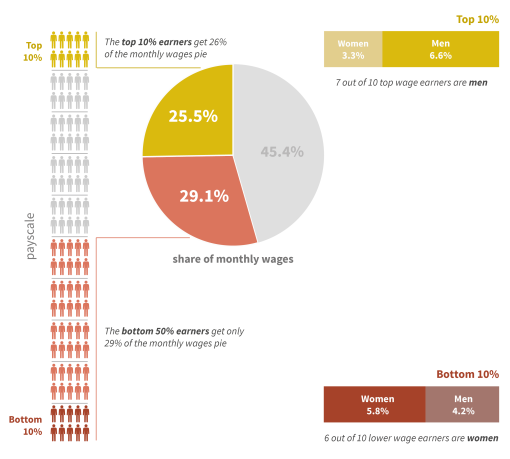What I propose, therefore, is very simple: it is nothing more than to think what we are doing.—Hannah Arendt
As the annual IATEFL orgasmatron reaches its climax, perhaps it’s time to stop, think, and ask two questions:
Who are we?
What we are doing?
And if you’re at conference – in the thick of the materials blizzard and the bright enthusiasm of ordinary teachers – here are my thoughts on these questions, and on the central problem facing language teachers: the systematic imposition of consent, or, the Violence of ELT.
This violence takes three forms: the imposition of a coursebook* system, the imposition of precarity, and the imposition of competition.
The coursebook system
(Tomlinson 2008:7)
To start we need to understand the difference between violence and power. Here Hannah Arendt writes that “power always stands in need of numbers, whereas violence up to a point can manage without them because it relies on implements” (Arendt 1970, 42). ELT relies on implements, and coursebooks are ELT’s implements of violence, a form of violence both upon the learner and teacher, what pioneering teacher Célestin Freinet might have called ‘pedagogical hashish’:
“Reading, for him, does not mean the repetitive reading, under supervision, of passages selected by the textbook author or the teacher. Reading is going in search of the text that is needed, whether for amusement or, above all, for action. Reading, as a technique for living, is above all, in Freinet’s words, lecture travail—‘work-oriented reading’—as opposed to ‘hashish’ reading that detaches the reader from reality and immerses him in fantasy.” (Legrand 1993: 5)
Tokers of this quasi-pedagogical pipe, the coursebook proponents, assert that coursebooks have their place and this assertion is proof of their value—a bit like saying ‘Brexit is Brexit’ or ‘My new healthcare plan is gonna be awesome’—mere unproven soundbites, or what sociologist Robert Merton calls pseudo-facts, something ‘socially plausible, in which appearances persuade though they may deceive’ (Merton 1959: xiii). Wrong … though intensely intoxicating—perhaps it’s time for teachers to stop taking hits from the coursebook bong.
(Inhale, exhale, just got a coursebook in the mail.)
Yet the strange thing is that despite little evidence of their efficacy, and plenty of research to the contrary, coursebooks (or their successors, digital coursebooks, materials packs etc) persist and proliferate—why? They persist because like cigarettes we’ve become addicted to the pedagogical nicotine they provide, and their Taylorist assembly-line form; a divided, segmented, easily-teachable series of pedagogy-pills laid out in a line; a system of division similar to the way we once divided up the world into colonies:
‘The colonial world is divided into compartments … Yet, if we examine closely this system of compartments, we will at least be able to reveal the lines of force it implies.’ (Fanon 2007; 29)
How do coursebooks come to be produced in the first place? We think it’s publishers who orchestrate and marshal their expertise to produce the finished product, yet Italian political theorist Mario Tronti’s ‘reversal of perspective’ (Tronti 1964) shows that it’s not business owners that are creative, but workers. Workers’ creativity needs to be captured first as a precondition of production; and workers’ resistance to this capture needs to be tamed.
So the coursebook system cannot survive without capturing the creativity of ordinary teachers first. But why would teachers submit themselves to producing implements that inflict both pedagogical violence on learners, and deskilling and worsening conditions upon their peers?
Because the coursebook system intersects with the imposition of precarity.
The imposition of precarity
Inequality has increased dramatically over the past few decades. In Europe alone, the top 10% of wage earners now earn over a quarter of all wages, while the bottom 50% of earners get only 29% of all wages.
There are two explanations here. Let’s put it into ELT terms. Either the top 10% in ELT are incredibly efficient and vastly more productive than the majority of working teachers—or the system that determines the distribution of wages is inherently unfair. (And one that disadvantages women over men.)

Taken from ILO Global Wage Report 2016/17
Obviously it’s a system problem, not an individual one.
Precarity itself – meaning a lack of security and material and social welfare – arises from a system of inequality which far from being natural, is man-made by institutions. (And can therefore be unmade.) In ELT, one element of this precarity-causing system is the entry-level Certificate qualification. This qualification, controlled by two public UK institutions, ensures that teachers have absolutely no control over entry to their profession, so a teacher with a Diploma and Masters can be paid the same as a backpacker. Why? Because there’s a constant stream of new entrants, often drawn to ELT because of unemployment and precarity at home. A vicious circle for us, yet a virtuous and profitable one for them.
This situation shows no sign of change simply because no one is willing to talk about it. That’s why I think ordinary teachers should petition Cambridge and Trinity to start a conversation on reforming the initial teacher qualification and slowing the ‘reserve army’ of new teachers driving down wages (and standards!) for all of us.
Learners might thank you too.
Unequal systems produce unequal institutions and events; and ELT operates as a Ponzi scheme. The yearly, centralized conference acts a magnet because this is where ‘deals are done’, where you ‘get noticed’. It’s the central node in a network of influence. But this network does not advocate for teachers. This network will not allow conversations about working conditions. This network (though not all of its members) thinks with a kind of ‘liberal ostrichism’ which ‘denies both its own politics and the politics of language’ (Pennycook 2001: 25-26). Again, it’s not an individual problem but a system problem; and in a world of Trump, Brexit, and threats to democracy within Europe, this apolitical mindset perpetrates an ELT opium dream not just violent in its effects, but unhinged.
Yet such as it is, this network can only work through imposing its source of kinetic power: competition.
The imposition of competition
Competition drives the ELT Ponzi scheme, with gurus at the top—and the majority competing for scarce resources at the bottom. The principle of competition also runs through IATEFL SIGs which are in competition with one another for members and resources, and TAs, formed on the basis of similar assumptions.
Unsurprisingly, SIGs with the highest number of members are those closest to the money nexus of the industry; the SIGs with the least members are those who challenge the status quo. Also, SIGs seem to be aligned with the economic interests of the industry rather than the best interests of teachers; and the central contradictions of ELT can never be addressed because SIGs and TAs have the same general philosophy. (Or those that dissent are marginalised.) In essence, why can’t teachers have a SIG to talk about our rights as workers—which, after all, covers all teachers regardless of sector? (There isn’t a coherent argument put forward as to why such a SIG cannot be formed, as I wrote here.) And why can’t anyone answer this basic question: Are we an industry or a profession?
Rather than solidarity the supreme value of ELT is competition, which is plainly illogical. This is because education (like health) is neither a commodity, nor is it created or consumed individually. Education is a co-production between teachers and learners; and co-production has solidarity – a debt to others – in its marrow. The imposition of competition makes no sense and should be resisted.
Some answers, 1, 2, 3…
There are no easy answers, but we can suggest experiments. Here’s one: A slow-motion teacher strike, neither reformist or revolutionary but something inbetween, a refusual to engage in violence, “a disengagement from direct confrontation and a refusal of dependency and entreaties, while pointing society in the direction of fundamental social change” (Holland 2011; 156). And here are some concrete steps:
- Form independent teacher groups that are allied to organisations that will improve your working conditions—unions.
- Disengage from institutions that won’t support you and create institutions that do. (Examples include TaWSIG, TEFL Guild, ELT Advocacy Ireland, Women in ELT, SLB Cooperative)
- Lobby stakeholders for change. If they won’t change then make them irrelevant.
- Share materials/ make materials/ download materials.
- Don’t support the coursebook system.
- Organise yourselves.
Perhaps we ought to open our eyes wider and see not the opportunities in chaos, but the chaos in opportunities. Because the current economic system in which we live, a system of (so-we-are-told) unlimited opportunity actually makes us all poorer, and the world a more brittle, fractured, divisive place. It’s a system of economic chaos, environmental waste, a producer of human scrap-heaps; a violent, chaotic system producing a violent chaotic world, of which ELT’s coursebooks and competitive impulses are merely a part, but also a reflection.
At the peak of its power perhaps this system has never been weaker; perhaps it’s time to think about who we are, what we are doing, and most importantly—how to stop the violence.
*See comments for my definition of coursebook as opposed to textbook
Bibliography
Hannah Arendt (1970). On violence. Houghton Mifflin Harcourt.
Hannah Arendt (2013). The human condition. University of Chicago Press.
Frantz Fanon (1995). Wretched of the Earth. Penguin.
Eugene Holland (2011) Nomad Citizenship: Free-Market Communism and the Slow-Motion General Strike. University of Manitoba. Robert K. Merton (1959). “Notes on Problem-Finding in Sociology.” Pp. ix–xxxiv in Sociology Today, edited by R. K. Merton, L. Borm, and L. S. Cottrel, Jr. New York:Basic Books.
Louis Legrand (1993). Célestin Freinet. Prospects, 23(1-2), 403-418. Available at http://www.ibe.unesco.org/sites/default/files/freinete.pdf Alastair Pennycook (2001). Critical applied linguistics: A critical introduction. Routledge. Brian Tomlinson (Ed.). (2008). English language learning materials: A critical review. Bloomsbury Publishing. Mario Tronti (1964). Lenin in England. Working class autonomy and the crisis: Italian Marxist texts of the theory and practice of a class movement, 79, 1-6. Available at https://www.marxists.org/reference/subject/philosophy/works/it/tronti.htm


To the numerous teachers who’ve assured me that I’m wrong, or ‘Let’s see him teach Engineering English in the African Savannah’ or that I think ‘Textbooks are the new Big Pharma, evil to the core’ – before you get all irate please note the difference between a textbook and a coursebook for the purposes of the above post.
A textbook ACCOMPANIES a course; a coursebook IS the course. With a textbook the teacher generally has more autonomy; with a coursebook the teacher generally has less autonomy. Here’s one example, the Oxford Textbook of Medicine (NOT the Oxford Coursebook of Medicine): http://oxfordmedicine.com/view/10.1093/med/9780199204854.001.1/med-9780199204854
There are further differences (use, conviviality, skill in implementation, written on the basis of expert knowledge vs. written on the basis of rules of thumb) but let’s be clear for purposes of analysis. NOTE: This is not a critique of individual teachers or their preferences, nor individual coursebooks, but a critique of a system.
Textbook: Oxford Textbook of Medicine
Coursebook: Headway Pre-Intermediate
Thanks.
Any more ELT rap lyrics? Best so far:
Don’t push me – cos I’m close to the ledge / I’m trying not to use Cutting Edge – MC Neil
English File – everywhere / Teachers focusing on forms like they just don’t care – MC Neil
It’s like a jungle path sometimes, it makes me wonder, how I keep from going under planned lesson timings, aha, aha – MC getgreatenglish
Ticket to ride, CELTA -> Headway / Tell all your friends this is the best way – MC StevieB
Today was a good day / I didn’t even have to use my Headway – MC Decentralized
Hello Paul,
I hope you don’t mind, but I thought that this post was extremely thought-provoking and referred to it quite a lot in my own post: https://teflmusingsblog.wordpress.com/2017/04/12/elt-a-history-of-symbolic-violence/
Apologies for any misreadings or misunderstandings,
Cheers,
Luke